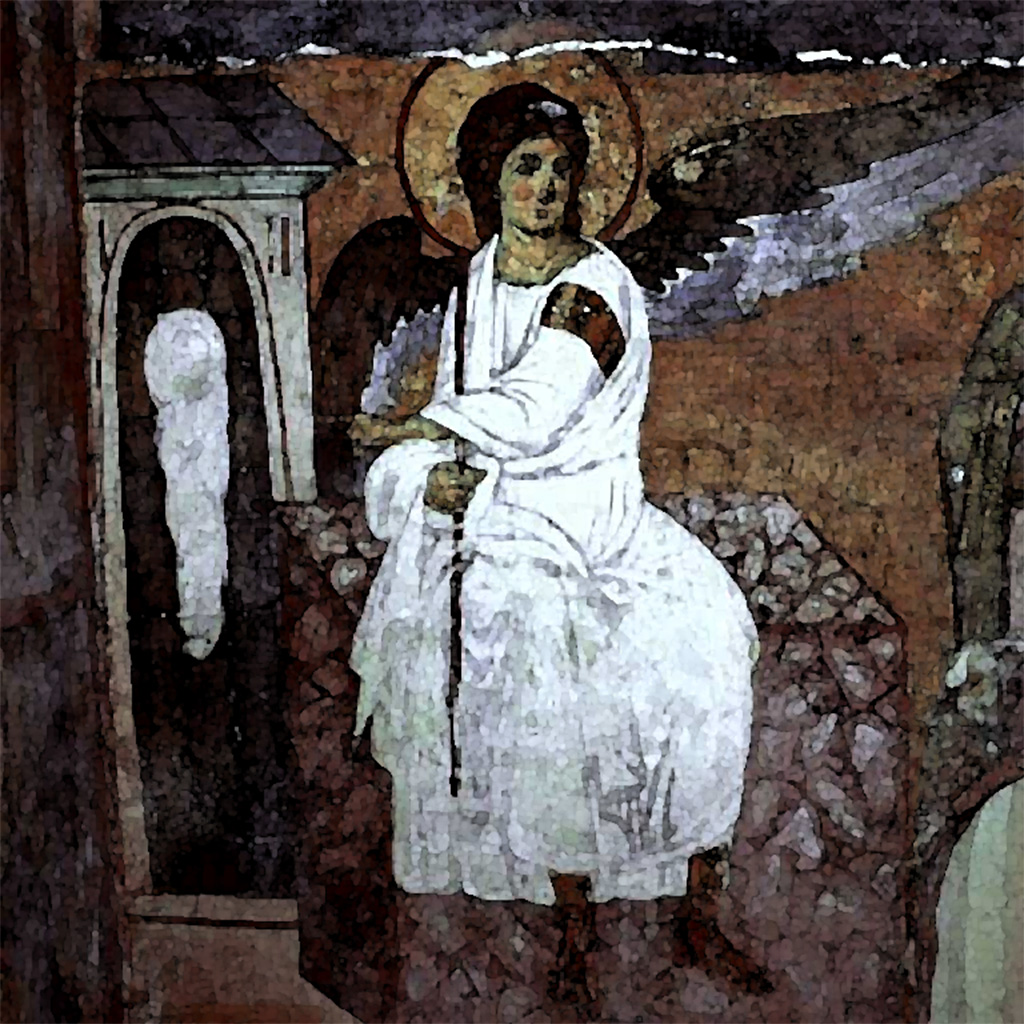Summary – The detectives show up at the Lafferty home to interrogate Ma Lafferty about the whereabouts of Ron and Dan. She claims they are not there. Pyre takes Brother Brady to the basement to interrogate him about the School of the Prophets meetings there. Brady claims that he experienced a “burning of the bosom” during those meetings and questions why Pyre is so sure those revelations weren’t true.
In a flashback, Ron travels to Oregon in search of “true Mormonism” from a man named John Bryant. He discovers Bryant’s commune practicing a “free love” version of polygamy and drinking wine, claiming it’s natural and spiritual and that the Word of Wisdom is an outdated part of the temperance movement. During a communal bath, Bryant explains that he’s received a revelation that he is the One Mighty and Strong and asks to baptize Ron. After he does, Ron is overcome with love and kisses Bryant.
Ron returns home to find the School of the Prophets working hard to print pamphlets of warning to the Church based on Prophet Onias’s revelations. They demand that polygamy and the priesthood ban for black members be restored. Onias tells Ron he believes that the six Lafferty brothers are chosen to help him in his work. He takes Ron up the mountain to his Dream Mine, where he believes a great treasure is buried under a capstone. Onias tells Ron that he believes Ron is the One Mighty and Strong and that Diana will come back to him when she sees how blessed he is in this work. Later in the episode, Ron writes a revelation to Diana and reads it to the School of the Prophets. They vote on its authenticity and approve it as true, declaring Ron as the one mighty and strong.
Meanwhile, in the present, Taba finds a recently sawed-off shotgun and takes this as evidence that Ron and Dan are nearby. When the detectives confront Ma Lafferty, she calls Taba a dark-skinned Lamanite and claims that the only law she’s subject to is the law of God. When they press her, she blames everything on two men who were with her sons, Chip and Ricky, who had long hair and smelled like skunk.
In flashback, Allen comes home to Brenda who is distressed about baby Erica’s fever, but Allen refuses to let her go to a doctor until he can figure out whether his brothers are right about not trusting modern medicine. They get into an argument during which he hits her. Brenda stands up and walks out. A little while later, Brenda’s sister comes to take her to the doctor while Brenda’s dad, Bishop Wright, stays with Allen and grills him about being too extreme in his religious beliefs. Meanwhile, Brenda tells her sister she wants to leave Allen because “this is how it started with Diana,” but her sister pressures her to stay or to let her bishop make the decision for her.
At the Pyre’s home, Pyre visits with Bishop Wright and Brenda as he tries to reassure them. The Wrights wonder if Pyre will be swayed by the “power” of the Lafferty name and question what he’ll do if the case causes trouble for people “above.” Pyre swears loyalty to Brenda alone and says that the Laffertys have no hold on him. Brenda’s sister gives Pyre a pile of her sister’s letters, hoping to piece together the events leading up to the murder. After the Wrights leave, Pyre gives his mother a bath. Grandma Pyre admits that she pinched Pyre’s wife and claims “the devil made me do it.” Pyre uses a “fake” priesthood blessing to calm her and get her to rinse her hair.
In flashbacks, Diana and Brenda’s letter got her a meeting with a member of the Seventy. The men offer the solution that “true revelation causes an increase in love and appreciation for the brethren.” Allen brings up the Mountain Meadows Massacre as a counterargument, saying that Brigham Young commanded it and it couldn’t have been inspired. The seventies try to push the issue aside, but Allen accuses them of inconsistency and storms out. Brenda asks the seventies to approve a divorce, but instead, they give Brenda a blessing, calling her to bring the Laffertys back into the fold. Brenda takes up this cause very literally, buying forbidden store-bought goods for her sisters-in-law and sending missionaries to talk with them. As a result of this meddling, Matilda arrives on Brenda’s doorstep with a warning: “A wife who alienates her husband from her children risks her life.” Because of this threat, Bishop Low and his wife smuggle Diana and her children out of town, though Brenda insists on staying to carry out her calling.
Pyre asks Allen about the likelihood that his brothers will leave Diana alone, but this conversation devolves into a discussion of Pyre’s faith crisis. Allen says he “tried to defeat the Church in my mind and see what was left.” He tells Pyre about a red book in his house that tells “a truer story of our people.” Pyre takes Allen’s book home and is reading it in the car and sobbing when his wife discovers him. He admits that he’s struggling, and she asks him to pray with her. He tries but he can’t. She tells him that she refuses to struggle through this with him and demands that he bear his testimony in church to strengthen their children’s faith.
Church History – Allen brings up the Mountain Meadows Massacre as the ultimate example of how revelation is inherently unsafe and unclear. He claims that Brigham Young ordered the massacre. The historical record about whether this is the case is complex, and beyond my scope of expertise. However, I do know that the Church was much more hesitant to comment about the massacre in the 80s, whereas now it has published an essay about the topic as well as supported the publication of a thorough book describing the evidence. So perhaps the Church leaders’ hesitancy to discuss the matter is authentic, even if Allen’s firm conclusions are not supported by the record. At one point in this episode, Allen claims to have read “all” of church history, which is a laughable claim considering the massive amount of documents available.
This episode also features a version of Brigham Young leading the wagon train into the Salt Lake Valley. It omits his famous phrase “This is the right place” in favor of a vaguely threatening statement about “how from this valley we will never run” and his intentions to fight back if people attack them, with lots of ominous music thrown in to make sure you know he’s a bad guy.
Shibboleths – Ma Lafferty mentions her sons’ innocence can be seen in “how Heavenly Father resides in them.” I’m not sure if this is just a weird Lafferty thing or meant to be an LDS phrase, but generally, we talk about the Spirit residing in our hearts or having the image of Christ in our countenance or being a child of God. This phrase is a strange amalgamation of the three. Grandma Pyre’s use of “the devil made me do it” is also totally alien. One of the primary values of the LDS church is agency and choice—we literally don’t believe the devil can make you do anything. I have never heard someone in our church use that phrase except in jest.
Also, I don’t know where Brenda found the missionaries she sends to her in-laws, but they certainly aren’t from our church. One missionary says that the gospel can reach anyone if they are “among the Lord’s elect.” The use of this phrase seems Calvinistic to me. LDS members would use that phrase to refer to those who choose to be righteous in this life, not those who are predestined by God to salvation. Then the missionaries have a whole conversation about capitalism and how it’s “part of Heavenly Father’s plan to help the Church prosper in the latter days.” Politically, members are generally (though not exclusively) pro-capitalism, but I’ve never heard anyone phrase it as a divine plan to enrich the Church. I mean, it’s possible that Brenda just pulled the oddest pair of missionaries in the Church (LDS missionaries are volunteer teenagers, so of course, some can be weird), but the whole conversation didn’t match up with any of the missionaries I’ve spoken with.
Priesthood Ban – In this episode, Prophet Onias claims that the black race was created when Satan taught Cain “to spill his seed with the animals.” I heard a lot of different justifications for the priesthood ban growing up in the 90s, but this one was new to me. The priesthood and temple restriction is a complex issue, so I will point those with questions to the Church’s official essay on the topic and to FAIR’s extensive resources.
In the World but Not of the World – Bishop Wright’s conversation with Allen showcases the variety of beliefs within the LDS culture. Bishop Wright feels comfortable listening to pop music; Allen does not. Allen interprets the Word of Wisdom as being primarily about caffeine which means chocolate is forbidden; Bishop Wright acknowledges that caffeine is problematic but feels certain that chocolate is okay. In both cases, Wright’s opinion is definitely the more common, but I have had ward members with Allen’s perspectives, and if Twitter is any indicator, so have many others. However, I still find this conversation between Bishop Wright and Allen problematic as it simplifies the discourse LDS members of that era had about caffeine and the Word of Wisdom and turns it into something sinister and strange, as though members didn’t regularly have these conversations every day. My family was anti-Coca Cola, but my aunt drank Diet Coke all the time. This is a normal community variation, not a sinister sign that Allen’s going off the deep end.
Priesthood Blessings – I found Pyre’s “fake” priesthood blessing to his mother to be very strange. There’s no reason he couldn’t have given his mother a real blessing of comfort. Why does he need to lie about it? It seems oddly blasphemous even for someone who’s doubting his faith. Most LDS men take the privilege of giving priesthood blessings very seriously; they are a sacred opportunity to serve others, not a tool for manipulation (see D&C 121:41-46). Likewise, the seventies giving Brenda a blessing and “calling” to bring her in-laws back to the fold is a fundamental misunderstanding of how LDS culture understands callings. A calling is our name for a church service position, like teaching the 8-year-olds’ Sunday School class, planning Young Women’s camp, or being a bishop. In our culture, a calling lasts a few years and people rotate in and out of them as needed by the ward. Whether her in-laws return to the Church is a matter of their own agency and would not have been understood as Brenda’s responsibility, though as a family member she would of course be looking out for them. I highly doubt that this event is real as it just doesn’t mesh with LDS cultural norms, but I’m open to being proven wrong.
Temple Divorce – Contrary to the way its portrayed in the episode, an LDS woman does not have to ask for permission from her church leaders to get a divorce. She might counsel with her bishop and stake president on whether she ought to try to save her marriage, but the decision is ultimately hers. What Brenda would have needed to ask higher church authorities for was a cancelation of her temple sealing to Allen, separate from the civil divorce which she was free to get on her own. So-called “temple divorces” need to be approved by a member of the First Presidency because a sealing is a covenant with God as well as with a spouse. A seventy would have no authority over the subject either way.
Personal Revelation – This episode attacks the idea of personal revelation from several angles. Brady claims that there’s no way to tell “whose revelation is right,” using examples of violence in the Old Testament to justify what the Laffertys have done. The seventies that Brenda visits claim that true revelation increases “love and appreciation for the brethren.” The School of the Prophets votes on whether Ron’s revelation is authentic, in a strange twist of the principle of common consent. I found it strange that the episode acts as though this subject is completely foreign to members when we discuss it all the time. The episode never brings up what I would think of as the most common indicators I hear as an ordinary member. Does the revelation agree with the prophet and the scriptures or contradict them? Does it cause us to feel good and to serve God’s children? And is the revelation for something that is within our stewardship? (That is, an ordinary member is not authorized to receive revelation for the whole church or even for his neighbor’s family.) The Laffertys’ revelations fail all of these tests. Personal revelation is something I believe in, but it’s a complex issue, one that Under the Banner of Heaven doesn’t represent with any nuance.
Rings True – Brady’s use of the phrase “burning in the bosom” is authentically LDS and derives from D&C 9:8. Allen and Bishop Wright’s conversation about caffeine and the Word of Wisdom reminded me of the speculations about the minutia that many church members did around that time with the question of caffeine in soda and alcohol in vanilla extract. Their conversation is a lot less complex than those that I experienced but still familiar.














